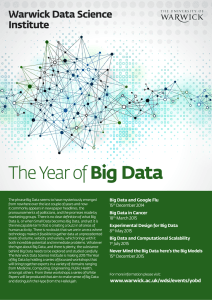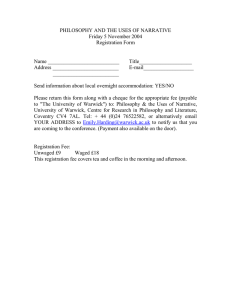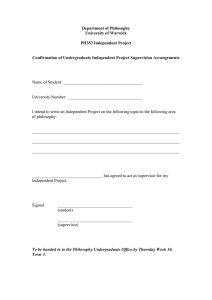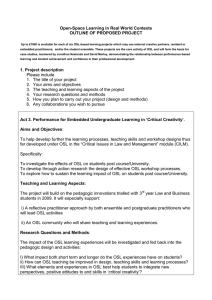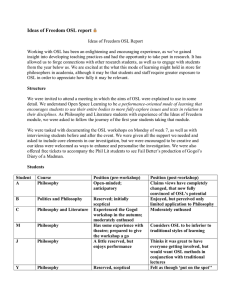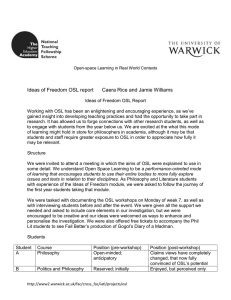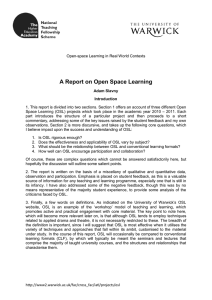Open-Space Learning in Real World Contexts OUTLINE OF PROPOSED PROJECT
advertisement
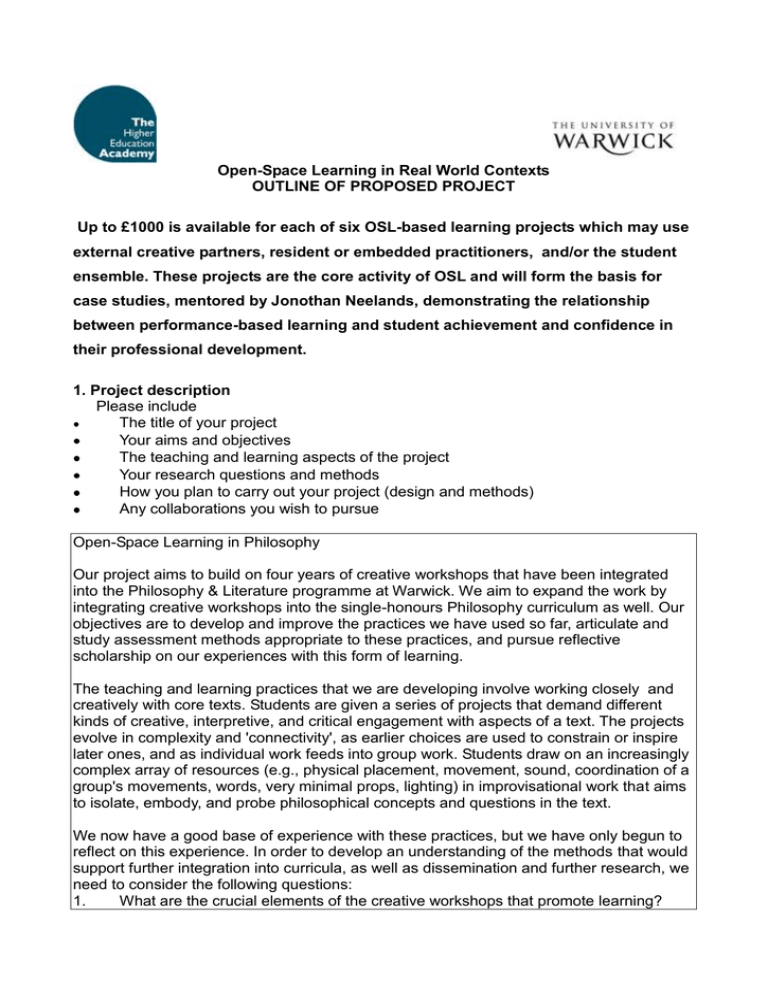
Open-Space Learning in Real World Contexts OUTLINE OF PROPOSED PROJECT Up to £1000 is available for each of six OSL-based learning projects which may use external creative partners, resident or embedded practitioners, and/or the student ensemble. These projects are the core activity of OSL and will form the basis for case studies, mentored by Jonothan Neelands, demonstrating the relationship between performance-based learning and student achievement and confidence in their professional development. 1. Project description Please include The title of your project Your aims and objectives The teaching and learning aspects of the project Your research questions and methods How you plan to carry out your project (design and methods) Any collaborations you wish to pursue Open-Space Learning in Philosophy Our project aims to build on four years of creative workshops that have been integrated into the Philosophy & Literature programme at Warwick. We aim to expand the work by integrating creative workshops into the single-honours Philosophy curriculum as well. Our objectives are to develop and improve the practices we have used so far, articulate and study assessment methods appropriate to these practices, and pursue reflective scholarship on our experiences with this form of learning. The teaching and learning practices that we are developing involve working closely and creatively with core texts. Students are given a series of projects that demand different kinds of creative, interpretive, and critical engagement with aspects of a text. The projects evolve in complexity and 'connectivity', as earlier choices are used to constrain or inspire later ones, and as individual work feeds into group work. Students draw on an increasingly complex array of resources (e.g., physical placement, movement, sound, coordination of a group's movements, words, very minimal props, lighting) in improvisational work that aims to isolate, embody, and probe philosophical concepts and questions in the text. We now have a good base of experience with these practices, but we have only begun to reflect on this experience. In order to develop an understanding of the methods that would support further integration into curricula, as well as dissemination and further research, we need to consider the following questions: 1. What are the crucial elements of the creative workshops that promote learning? 2. How are the interpretive and creative decisions made by participants relevant to conceptual understanding, reasoning, and critical engagement with texts? 3. What is the potential of these practices for specifically philosophical learning? We will design and implement the project initially via the collaboration we have in place between Research Associate Jonathan Heron, who designs and leads the workshops, and the faculty involved in the degrees and modules concerned, Eileen John (Philosophy), Michael John Kooy (English), and Naomi Eilan (Philosophy). The project will furthermore draw on the work of two student researchers and the work of the student participants, who will be asked to contribute to the reflective study of the workshops. We will use this opportunity to extend our collaboration to other theatre practitioners, academic philosophers and student groups. 2. Which aspect of Open-space Learning does the project address? (Please include all that apply and give details of how they will be addressed) • Exploring innovative teaching and learning in and for the higher education community in England • Applying workshop practice and collaborative learning in flexible teaching spaces • Employing enactive and experiential learning, applied drama, and role play • Identifying workable assessment methodologies for these styles of learning • Testing the efficacy of OSL and measuring its impact This project will incorporate all of these aspects of Open-Space Learning. The workshops take students into flexible teaching spaces, outside the traditional classroom, and ask them to enact ideas and questions, to work with visual, auditory, physical, and affective experience, to make dramatic and performative decisions in relation to texts, and to imagine and take on roles. We will be studying the impact of these teaching and learning practices and will be developing assessment methods. This project is innovative within UK higher education, as well as in the international context. Two student researchers will conduct ethnographic research and create digital records. How does your project link with the aims and objectives of the OSL project? This project supports the aims of the larger OSL project, by putting the students' dynamic and creative activity at the centre. While the teachers and workshop leaders have a crucial role in the design and implementation of the workshops, the substantive outcomes of the work depend on the individual and collaborative decisions of the students and on their creative and intellectual engagement with the tasks at hand. We aim to produce accessible documentation and reflective scholarship on the project that will support dissemination and sharing of practices across the university and with other HE institutions. 3. Timescale Preferred start date: …… October 2010 Estimated completion date: …… July 2011 What is your proposed schedule of work for this project? Please indicate the numbers of students involved and key dates. Autumn Term 2010 Planning time with Philosophy dept Tuesday 19th October 1st Year Phil/Lit Induction Workshop (25 students) Research students creating digital space Spring Term 2011 21st /22nd January 1st Year Phil/Lit Theatre Trip (Fail Better @ WAC) Optional Theatre Trip for Philosophy IoF students Research students monitoring digital space 21st/ 22nd February 1st Year Philosophy module Idea of Freedom Workshops x4 (80) Research students processing documentation 19th March Phil/Lit Weekend (30 students) Summer Term 2011 Reviewing documentation Journal Article Co-authored Report to OSL team Autumn Term 2011 Journal Submission for publication Digital materials available online 4. Impact What are the expected outputs and outcomes of your project? What are your success criteria? Creative embodied engagement with philosophical and literary texts successful work will give students in-depth grasp of issues in play in texts and will support philosophically substantive questioning of texts Engaging the full variety of learning styles successful work will allow all students to participate (with no intimidation or exclusion of students not oriented toward theatrical performance), and will promote both individual and collaborative activity Curriculum and assessment development for creative workshops successful curricular design and assessment methods will need to meet the requirements of faculty committees charged with approving new curricula and assessment methods; we specifically aim to produce materials and methods that can be consistently and fairly implemented by different staff and that preserve and properly value the innovative dimensions of the students' activity Public dissemination of research successful research will result in journal publication and conference participation; digital materials will be published online; performance at the proposed festival 5. Dissemination and evaluation How do you see the outputs disseminated within the University of Warwick and outside? Publicly accessible online archive of resources: • this will allow us to disseminate new assessment methods and curricular materials within Warwick; these would also be disseminated via standard procedures for approving new methods and curricula within the university • this will allow dissemination beyond Warwick; we envisage that the online archive, including filmed documentation, would allow programmes at other universities to replicate and build on our practices at Warwick Public presentation of results group members, including student researchers, will be encouraged to present at relevant workshops and conferences in the UK • Interdisciplinary journal publication the research on this project is relevant to work in performance and pedagogy, and also to work in philosophy and literature on the role of creative and imaginative thought in philosophical understanding; depending on the results of the research, we aim to publish in at least both of these areas • How will you evaluate the success of your project? • Two research students will observe, document and evaluate each workshop • The project team with theorise the practice as part of the journal article • Student participants will complete evaluation forms and contribute to our digital forum • The use of online resources will be closely monitored, and we will solicit feedback on the resources 6. Resources What are the resources you need to carry out your project? e.g Travel, video/audio recording, fees, specialist equipment, clerical support… Signature of applicant: ……………………………………………… Name (please print): Eileen John ………………………………….. Date: 22 January 2010 …………………………………………. Please submit this form to Dr Susan Brock, The CAPITAL Centre, Millburn House E: s.l.brock@warwick.ac.uk ; T: 024761 50067. H:\OSL/projects//outline of proposed project Aug. 09
